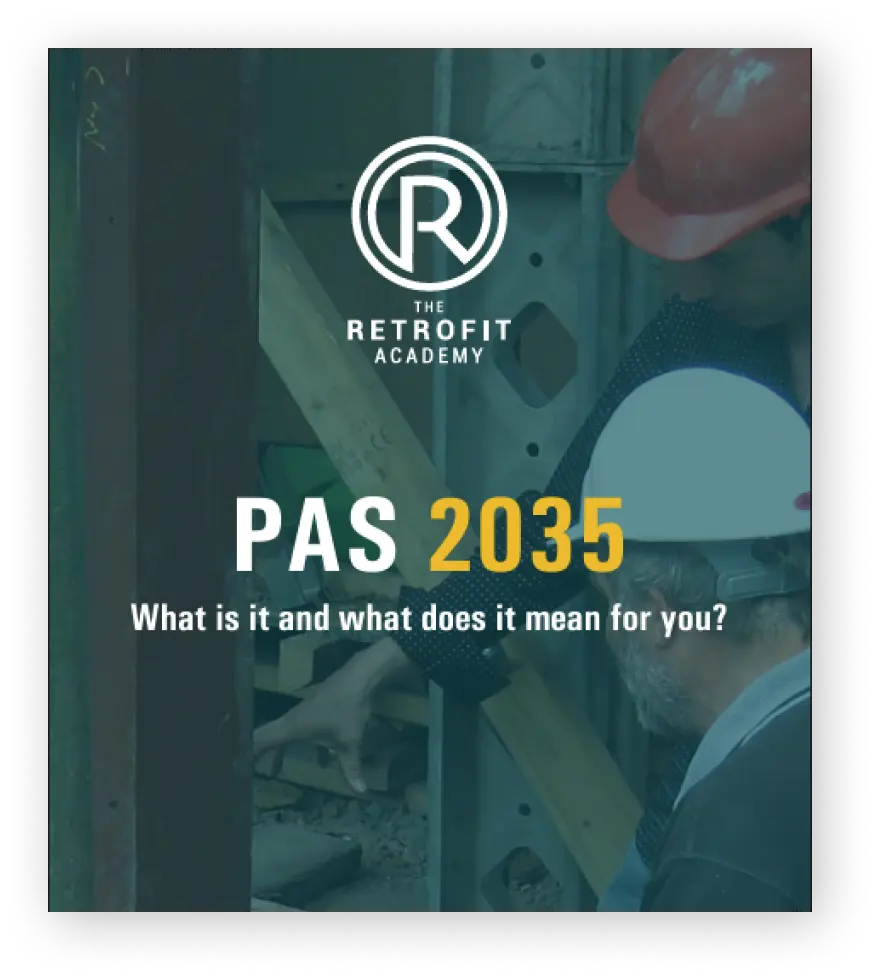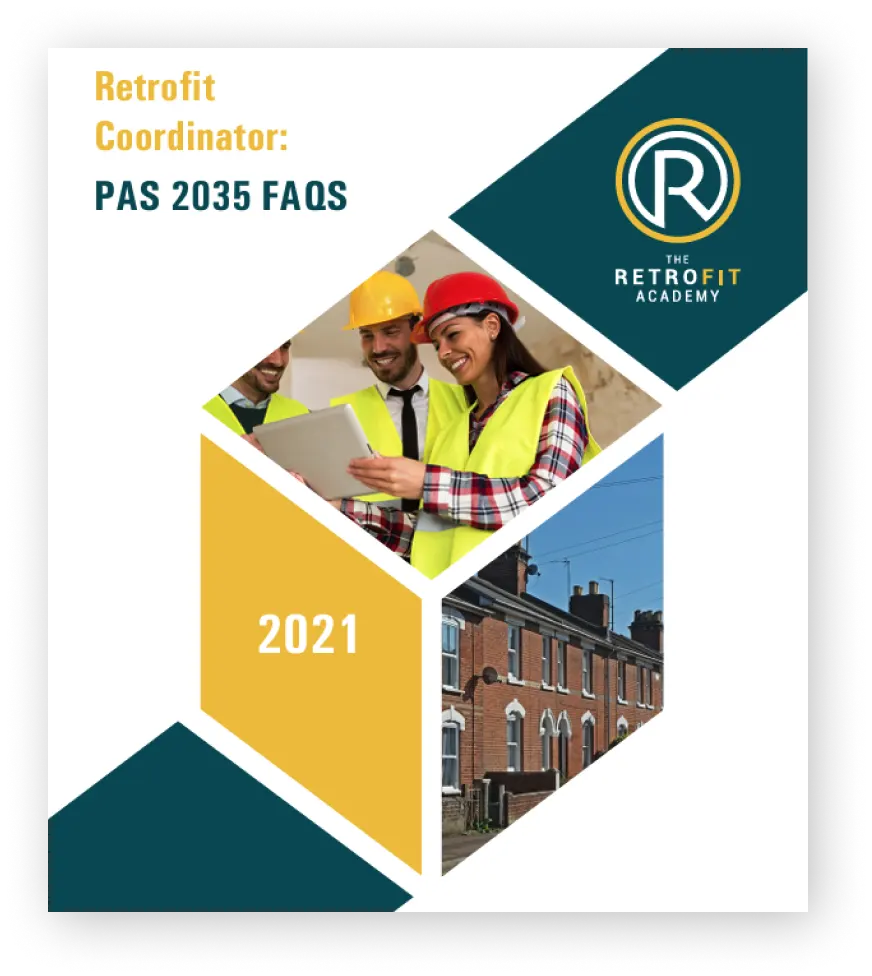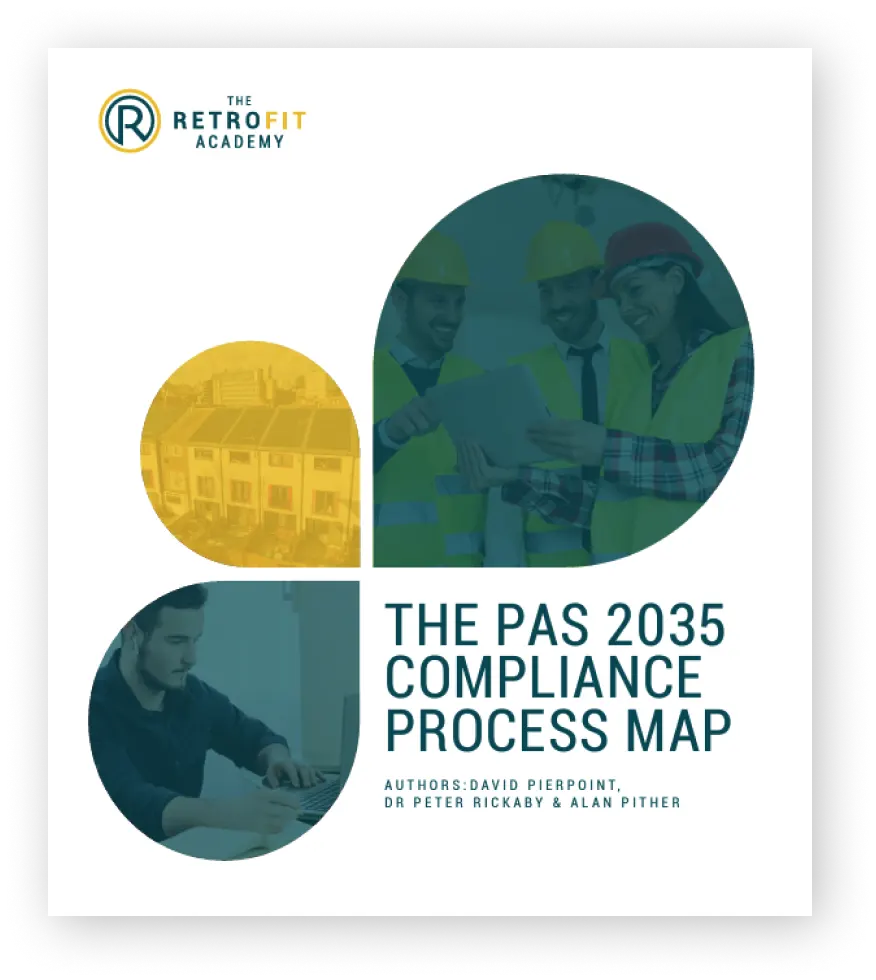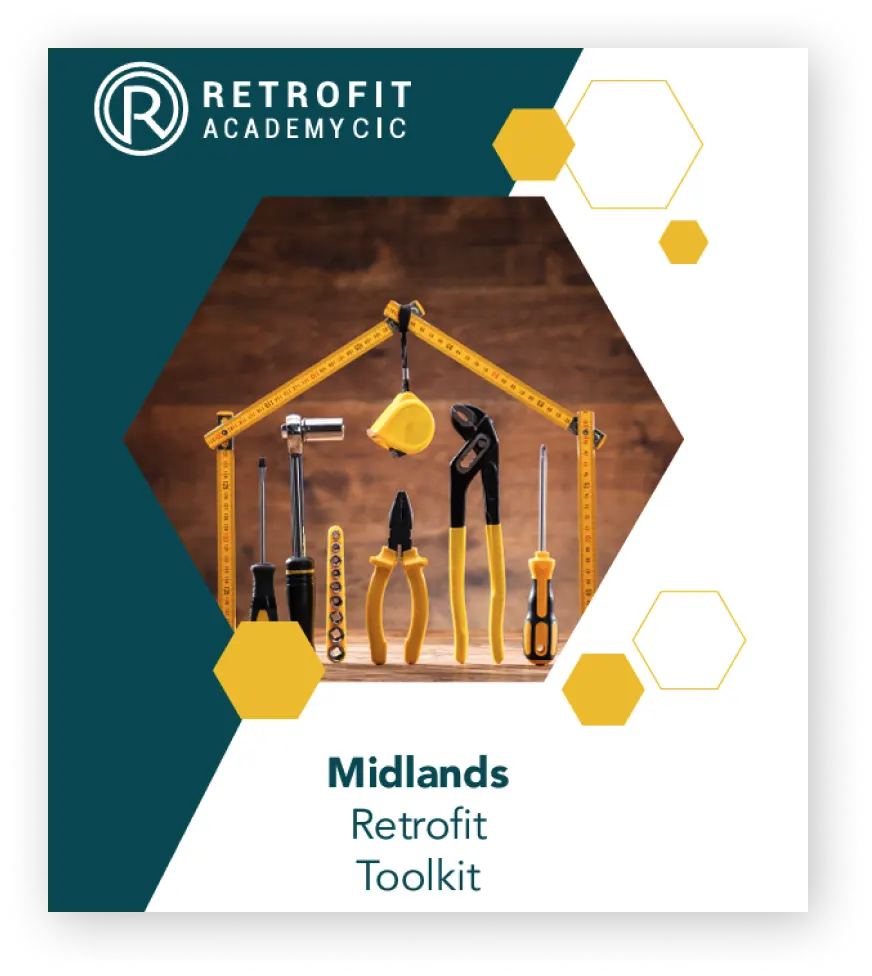PAS 2035 Guide
The British Standard for Retrofitting Domestic Properties
Setting the Standard for Domestic Retrofit
PAS 2035 is the British Standard for retrofitting dwellings. First published in 2019, the standard outlines how retrofit projects should be managed and delivered and it is at the heart of all The Retrofit Academy’s courses.
Compliance with the PAS 2035 Standard is a requirement of all retrofit programmes deploying government funding. You can find a range of free resources here to help you get to grips with what’s involved.
Raising the Standards of Retrofit: Why is PAS 2035 Needed?
PAS 2035 was published in May 2019 following the Each Home Counts Review, which uncovered systemic failures and poor standards in retrofit delivery.
These failures can result in expensive problems being left behind, often resulting in issues such as dampness, mould and condensation. When we make buildings more airtight without ventilating them properly, these problems are all too common.
Recognising the challenges ahead, the Each Home Counts review recommended an industry-wide Code of Practice which led to the development and publication of PAS 2035.
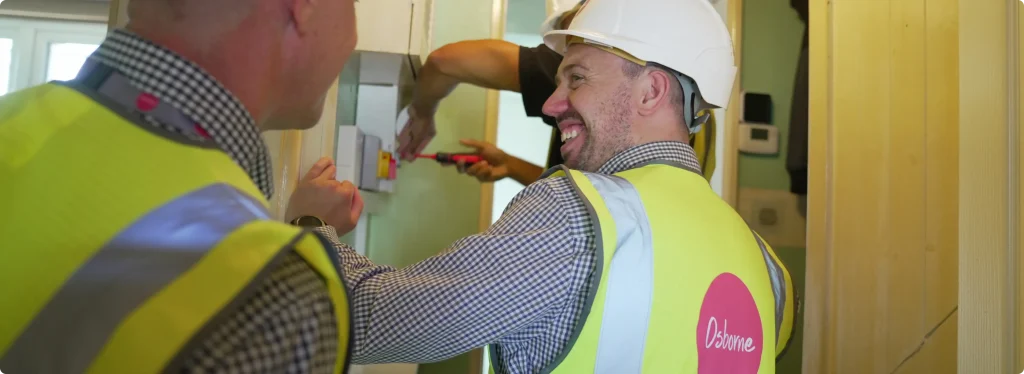
What Does PAS 2035 Cover?
PAS 2035 outlines the what, when and who of retrofit projects.
It introduces several specialist roles and what qualifications and experience those people must have to practise. Examples include the retrofit designers, coordinators, assessors and advisors that The Retrofit Academy trains.
It lays out a logical sequence for retrofit projects to follow, ensuring that a building and its occupants receive the retrofit measures most appropriate to them. PAS 2035 has the protection of the homeowner front and centre.
Core Principles of PAS 2035
At the heart of PAS 2035 are core principles that ensure high-quality outcomes:
- Fabric First: Reducing heat demand by improving the building’s fabric before introducing new energy systems.
- Whole House Retrofit: Treating the home as a complete system to deliver optimal results.
- Build Tight, Ventilate Right: Preventing issues like dampness by balancing airtightness with proper ventilation.
- Quality, Quality, Quality: Setting the highest standards to minimise defects and maximise efficiency.
The Key Roles in PAS 2035
PAS 2035 defines five key roles essential to successful retrofitting:
- Retrofit Advisor: Provides guidance to clients and householders.
- Retrofit Assessor: Conducts in-depth property assessments.
- Retrofit Coordinator: Oversees the entire retrofit process and ensures compliance.
- Retrofit Designer: Prepares retrofit designs tailored to specific properties.
- Retrofit Installer: Implements energy efficiency measures on-site.
These roles ensure every project is planned, executed, and evaluated to the highest standards. The Retrofit Academy supports professionals in achieving the qualifications needed for these critical positions.
Explore Our PAS 2035 Resources
We are the driving force in retrofit skills and knowledge. This is reflected in our extensive library of resources covering both PAS documents, including:
PAS 2035 FAQs
The PAS2035 is the framework for improving energy efficiency for existing homes, ensuring projects are completed to high standards and comply with government guidelines. Our courses teach the knowledge and skills required to work within this framework.
Compliance with PAS 2035 is mandatory for all retrofit projects using government funding, such as the Energy Company Obligation (ECO) and Warm Homes programme. Additionally, businesses not using public funding are encouraged to adopt the standard voluntarily, as it demonstrates a commitment to quality and builds consumer confidence.
The updates to PAS 2035 and PAS 2030 were recommended by the BSI Retrofit Standards Task Group (RSTG) and included input from TrustMark, DESNZ, and the Scottish Government. The revised standards, published on 28th September 2023, incorporate lessons learned and reflect national policies, prioritising a whole-house retrofit approach and sustainability. These updates are essential for keeping retrofit practices aligned with net-zero targets and consumer needs.
The revised PAS 2035 introduces several improvements to enhance retrofit project quality, including:
- Requiring Medium-Term Improvement Plans for all projects.
- Strengthened guidance on airtightness, moisture management, and ventilation.
- Greater emphasis on climate adaptation and mitigation.
- Specific provisions for traditional or historic buildings, ensuring compliance with BS 7913.
A more comprehensive design process to minimise risks and unintended consequences. These updates are designed to ensure projects deliver long-term energy savings while safeguarding occupant well-being.
Projects initiated under the 2019 standards can continue during the 18-month transition period, provided they meet the existing requirements. However, from 30th March 2025, all retrofit projects must comply with PAS 2035:2023. This transition period allows businesses to adapt to the updated standards without disrupting ongoing work.
The revised PAS 2035:2023 and PAS 2030:2023 standards come into full operation on 30th March 2025, following an 18-month transition period. This allows businesses, certification bodies, and training providers time to adopt the new standards. From this date onwards, all retrofit projects must comply with the 2023 standards.
PAS 2035 is a framework for project delivery, introducing a systems approach to retrofit that helps to avoid the many unintended consequences of poor practice. It addresses the fundamental structural problems that blight many energy efficiency projects, no matter how well-intentioned the participants may be. Problems such as:
- Defects: 10% of all solid wall insulation projects resulted in a Type-1 Fail (Ofgem 2013).
- Unintended Consequences: Health and social problems made worse by retrofit,
- not better.
- Shallow Retrofits: Availability of funding resulting in the installation
- of single-measures at the wrong time and place.
- Accountability: Rules of the game meaning the buck is continually passed on, resulting in litigation
- Poor Design: Low-profit margins exclude building professionals from engagement in retrofit
- Performance Gaps: When predicted energy savings aren’t achieved.
The standard ensures high-quality, holistic planning, reducing risks and achieving the intended outcomes for homeowners.
PAS 2035 provides a structured approach to retrofit projects, ensuring that each home is evaluated and upgraded to meet its specific needs. By addressing factors like insulation, ventilation, and airtightness, the standard helps reduce energy demand while improving indoor comfort and air quality. Measures are implemented in a logical sequence to achieve durable, energy-efficient results.
For traditional or historic buildings, PAS 2035 mandates adherence to BS 7913: Guide to the Conservation of Historic Buildings. These projects are typically categorised as high-risk and require professionals to hold specialised qualifications, such as the ABBE Level 3 Award in Energy Efficiency and Retrofit of Traditional Buildings. The standard ensures retrofits respect the building’s heritage while improving energy performance.
The Retrofit Academy are the driving force in retrofit training, skills and knowledge, providing high-quality training and qualifications for all PAS 2035 roles. Visit All Courses to view our available training options, or visit our Funding and Grants page to see what financial support may be available to you.
The Significance Assessment is defined in BS 7913. There is a simplified version (applicable in Path B only) on the BSI website, which can be downloaded for free.
In parallel to the PAS 2035 process, BEIS (now the Department for Energy Security and Net Zero) also supported TrustMark to prepare itself to become the established Quality Mark for the sector. Businesses operating under the TrustMark would have to comply with a Code of Conduct a Code of Practice and a Customer Charter. The Code of Practice adopted by TrustMark is PAS 2035, as well as PAS 2030 (2019) for Installers.
A Retrofit Coordinator has to register with one of the TrustMark-approved Retrofit Coordinator schemes. While there are several TrustMark scheme providers, The Retrofit Academy works in partnership with Sterling Accreditation to operate its own TrustMark scheme.
